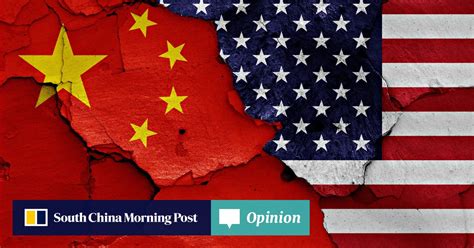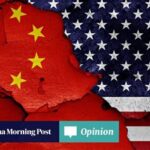
China has abruptly ceased its significant sell-off of U.S. equities, a move impacting approximately $1 billion in holdings, prompting speculation about whether the decision stems from a strategic economic maneuver or a shift in geopolitical positioning between the two global superpowers.
Beijing’s sudden halt to the liquidation of its U.S. stock portfolio, confirmed by several financial analysts and economists tracking the capital flows, has injected uncertainty into the market, leaving investors and policymakers alike to ponder the underlying motivations. The scale of the previous selling activity signaled a potential recalibration of China’s investment strategy in response to escalating trade tensions, technological competition, and broader diplomatic friction with the United States. Now, the abrupt reversal has added another layer of complexity, raising critical questions about China’s long-term vision for its massive foreign exchange reserves and its approach to managing its relationship with the U.S. economy.
This shift occurs against a backdrop of already strained economic and political ties. Over the past year, China has gradually reduced its exposure to U.S. assets, reflecting concerns about potential sanctions, regulatory pressures, and the overall stability of the U.S. market. However, the complete cessation of the recent sell-off indicates a possible reassessment of these risks, or perhaps a calculated move to stabilize market conditions and prevent further economic disruptions.
The implications of China’s decision are far-reaching. A continued offloading of U.S. equities could have exerted downward pressure on stock prices and potentially triggered broader market instability. The current pause may alleviate some of these concerns, at least in the short term. However, the underlying drivers of China’s investment decisions remain complex and subject to change, making it essential for investors to closely monitor developments and adjust their strategies accordingly.
Analysts suggest several factors could be influencing China’s abrupt change of course. Firstly, economic considerations might be at play. China may have determined that further selling would be counterproductive, leading to losses on its remaining U.S. holdings and destabilizing its own financial system. Secondly, geopolitical factors could be a significant driver. By ceasing the equity sell-off, China may be signaling a desire for improved relations with the U.S. or attempting to de-escalate tensions in certain areas. A third possibility is that China is simply rebalancing its portfolio in response to changing global economic conditions, seeking higher returns in other markets or prioritizing investments in domestic industries.
“This move could be interpreted as a tactical pause rather than a permanent shift,” said Dr. Emily Carter, a professor of international finance at Columbia University. “China is likely weighing the costs and benefits of its U.S. equity holdings in the context of its broader economic and geopolitical goals. We need to see sustained data over the next few months to determine the real direction.”
The specific details of China’s U.S. equity holdings are closely guarded, making it challenging to fully assess the impact of its investment decisions. However, estimates suggest that China holds hundreds of billions of dollars in U.S. stocks, bonds, and other assets. Even a small percentage change in these holdings can have significant implications for market prices and investor sentiment.
This situation unfolds as the United States and China navigate a complex web of trade disputes, technological rivalry, and geopolitical competition. The two countries have engaged in rounds of tariff negotiations, with each side seeking to gain leverage over the other. In addition, the U.S. has imposed restrictions on Chinese technology companies, citing national security concerns, while China has responded with its own measures targeting U.S. firms.
The future trajectory of U.S.-China relations remains uncertain, but the economic dimension is likely to play a crucial role. China’s management of its U.S. equity holdings will be a key indicator of its strategic intentions and its willingness to cooperate with the United States on economic issues.
The halt in the equity fire sale has also opened a new chapter in the ongoing debate about the weaponization of finance. Some analysts argue that China could use its massive foreign exchange reserves as a tool to exert political pressure on the United States. By threatening to sell off U.S. assets, China could potentially destabilize the U.S. economy and force policymakers to reconsider their stance on trade, technology, and other contentious issues.
However, other analysts caution against overstating the potential impact of such actions. They argue that China has a strong incentive to maintain the stability of the U.S. financial system, given its significant holdings of U.S. assets. A sharp decline in the value of the U.S. dollar or U.S. stocks would hurt China’s own economy and undermine its long-term investment goals.
“China’s actions are not just about economics; they are deeply intertwined with geopolitics,” noted John Edwards, a senior analyst at the Peterson Institute for International Economics. “Understanding this interplay is crucial for interpreting their investment decisions and anticipating their future moves.”
As the global economy continues to evolve, and as the relationship between the U.S. and China ebbs and flows, the management of these substantial equity holdings will continue to be a closely watched barometer of the broader geopolitical landscape. Investors, policymakers, and economists alike will be scrutinizing every move, seeking to understand the motivations behind China’s decisions and the potential implications for the global economy.
The recent move also invites scrutiny of the internal economic pressures within China. China’s economy faces challenges including a slowing growth rate, demographic shifts, and increasing levels of debt. Managing its foreign exchange reserves effectively is critical to maintaining economic stability and supporting domestic industries.
The decision to halt the sale of U.S. equities could be seen as a move to conserve capital and ensure that China has sufficient resources to address these internal challenges. Alternatively, it might reflect a belief that the U.S. market still offers attractive investment opportunities, despite the risks.
Whatever the underlying reasons, the abrupt halt to China’s U.S. equity sell-off underscores the complex and dynamic nature of the relationship between the two economic giants. It highlights the need for careful analysis, strategic thinking, and a willingness to adapt to changing circumstances.
The ramifications extend to the global stage. Other nations are watching closely, seeking to understand how China’s actions will impact their own economies and their relationships with both the U.S. and China. This situation underscores the increasing interconnectedness of the global financial system and the importance of international cooperation in addressing economic challenges.
In-depth Analysis of Potential Factors and Implications:
-
Economic Considerations: China’s decision to halt the sale might be rooted in a reassessment of the U.S. market’s potential. Despite ongoing tensions, the U.S. remains the world’s largest economy and a significant driver of global growth. China may have concluded that a continued sell-off would be detrimental to its own financial interests. This could be due to several factors:
- Preservation of Capital: Selling off assets in a depressed market can lead to significant losses. China may have decided that it is more prudent to hold onto its U.S. equities and wait for a more favorable market environment.
- Diversification Challenges: Finding suitable alternative investments that offer comparable returns and liquidity can be challenging. China may have struggled to find alternative investment options that are as attractive as U.S. equities.
- Currency Stability: A massive sell-off of U.S. assets could put downward pressure on the U.S. dollar, which would, in turn, impact the value of China’s remaining dollar-denominated assets. Maintaining the stability of the U.S. dollar is in China’s best interest, at least in the short term.
-
Geopolitical Maneuvering: The decision could also be a strategic move aimed at improving relations with the U.S. or de-escalating tensions. By halting the sell-off, China may be signaling a willingness to cooperate on economic issues and avoid actions that could further destabilize the relationship. This could be motivated by several considerations:
- Trade Negotiations: China may be hoping to create a more favorable environment for trade negotiations with the U.S. By demonstrating a willingness to avoid actions that could harm the U.S. economy, China may be seeking to gain leverage in these negotiations.
- Avoiding Escalation: The U.S. and China are engaged in a complex web of disputes, ranging from trade to technology to human rights. China may be seeking to avoid further escalation of these disputes by signaling a willingness to de-escalate tensions on the economic front.
- Strategic Patience: China may be adopting a strategy of “strategic patience,” waiting for a more favorable political climate in the U.S. before taking any further actions that could damage the relationship.
-
Portfolio Rebalancing: Another possibility is that China is simply rebalancing its portfolio in response to changing global economic conditions. This could involve shifting investments from U.S. equities to other asset classes or other markets. This rebalancing could be driven by several factors:
- Emerging Markets: China may be seeking to increase its investments in emerging markets, which are expected to experience faster growth in the coming years.
- Domestic Investments: China may be prioritizing investments in its own domestic industries, particularly in sectors that are considered strategic, such as technology and renewable energy.
- Alternative Asset Classes: China may be seeking to diversify its portfolio by investing in alternative asset classes, such as real estate, infrastructure, and private equity.
-
Internal Economic Pressures: China’s domestic economic challenges could also be influencing its decision to halt the sale. These challenges include:
- Slowing Growth: China’s economy has been slowing in recent years, and the government is facing pressure to stimulate growth and create jobs.
- Demographic Shifts: China’s population is aging, and the workforce is shrinking, which could put a drag on economic growth.
- Debt Levels: China’s debt levels have been rising rapidly, and there are concerns about the stability of the financial system.
Managing its foreign exchange reserves effectively is critical to maintaining economic stability and supporting domestic industries. The decision to halt the sale of U.S. equities could be seen as a move to conserve capital and ensure that China has sufficient resources to address these internal challenges.
- Impact on US Economy: The initial selling pressure exerted by China could have had several effects on the US economy, including:
- Downward pressure on stock prices: A large sale of equities can lower the price of those stocks.
- Increase in US Treasury yields: To counter the effect of the sell-off, the US Federal Reserve may have had to purchase Treasury bonds, increasing their yields.
- Dollar depreciation: A large sell-off of US assets could weaken the dollar.
Expanded Contextual Information:
China’s foreign exchange reserves are among the largest in the world, and their management is a critical component of the country’s economic strategy. These reserves serve several important functions:
- Supporting the Yuan: The reserves are used to intervene in the foreign exchange market and manage the value of the Chinese yuan.
- Financing Trade: The reserves are used to finance international trade and investment.
- Providing a Buffer: The reserves provide a buffer against economic shocks and financial crises.
The composition of China’s foreign exchange reserves is a closely guarded secret, but it is widely believed that the majority of the reserves are held in U.S. dollars. This reflects the dominance of the U.S. dollar as a reserve currency and the importance of the U.S. market to the Chinese economy.
However, China has been gradually diversifying its foreign exchange reserves in recent years, reducing its exposure to the U.S. dollar and increasing its holdings of other currencies, such as the Euro, the Japanese Yen, and the British Pound. This diversification is aimed at reducing China’s vulnerability to fluctuations in the value of the U.S. dollar and increasing its flexibility in managing its foreign exchange reserves.
The decision to halt the sale of U.S. equities is just one example of the complex and dynamic nature of China’s foreign exchange reserve management. The country’s leaders are constantly weighing the costs and benefits of different investment strategies, taking into account economic, political, and strategic considerations.
Frequently Asked Questions (FAQs):
-
Why did China abruptly stop selling U.S. equities?
- The reasons are multifaceted and could include economic considerations (preventing losses and maintaining market stability), geopolitical maneuvering (de-escalating tensions with the U.S.), portfolio rebalancing (shifting investments to other assets or markets), or internal economic pressures within China. It’s likely a combination of these factors.
-
What was the total value of U.S. equities China was selling?
- The article states that the action impacted approximately $1 billion in holdings. This figure represents the recent sell-off that was halted. The total value of China’s overall U.S. equity holdings is much larger, estimated to be hundreds of billions of dollars.
-
How could this decision affect the U.S. economy and financial markets?
- The halt in selling could provide some stability to the U.S. stock market, preventing further downward pressure on stock prices. However, the underlying economic and geopolitical tensions remain, so the long-term impact is uncertain.
-
Does this mean U.S.-China relations are improving?
- It’s too early to tell definitively. The cessation of the sell-off could be a signal of a desire for improved relations, but it could also be a tactical move driven by economic considerations. Continued monitoring of both economic and diplomatic activities is necessary.
-
What are the alternative investment options for China if it reduces its U.S. equity holdings?
- China could invest in other asset classes, such as bonds (issued by other countries or international organizations), real estate, infrastructure projects, or private equity. They could also increase investment in their domestic markets or other emerging economies.
Expert Opinions and Analysis:
Economists and financial analysts are divided on the long-term implications of China’s actions. Some believe that this is a temporary pause in a broader trend of diversification away from U.S. assets. They argue that China is increasingly concerned about the risks of investing in the U.S., including potential sanctions, regulatory pressures, and political instability.
Others believe that China will continue to hold a significant portion of its foreign exchange reserves in U.S. assets, given the size and liquidity of the U.S. market. They argue that China has a strong incentive to maintain the stability of the U.S. financial system, given its significant holdings of U.S. assets.
“The key question is whether this is a tactical pause or a strategic shift,” said Dr. David Miller, a professor of economics at Yale University. “If China is truly committed to diversifying away from U.S. assets, we could see a more significant impact on the U.S. economy in the long run.”
Regardless of the long-term implications, the recent halt in the equity fire sale underscores the complex and dynamic nature of the relationship between the U.S. and China. It highlights the need for careful analysis, strategic thinking, and a willingness to adapt to changing circumstances.
The decision also has implications for other countries around the world. As the two largest economies in the world, the U.S. and China have a significant impact on the global economy. Their relationship is closely watched by other countries, and any changes in their policies can have ripple effects around the world.
For example, if China were to significantly reduce its holdings of U.S. assets, it could put downward pressure on the U.S. dollar and increase interest rates in the U.S. This could have a negative impact on the U.S. economy and could also affect other countries that are heavily reliant on trade with the U.S.
Geopolitical Ramifications Elaborated:
The geopolitical implications of China’s actions extend beyond the immediate economic effects. The decision to halt the sell-off can be interpreted as a strategic signal in the broader context of U.S.-China relations. It could indicate a desire to stabilize relations and avoid further escalation of tensions, particularly at a time when the global economy is facing numerous challenges.
However, it is also important to consider the possibility that China is simply biding its time, waiting for a more opportune moment to take further action. China’s long-term strategic goals remain unclear, and its actions should be interpreted in the context of its broader geopolitical ambitions.
Some analysts believe that China is seeking to challenge the United States’ dominance in the global economic and political order. They argue that China is using its economic power to exert influence around the world and to promote its own interests.
If this is the case, then the decision to halt the sell-off could be seen as a tactical move aimed at preserving its financial resources and avoiding actions that could weaken its position in the long run.
Other analysts believe that China is primarily focused on its own internal economic development and that it is not seeking to challenge the United States’ position in the world. They argue that China’s actions are driven by pragmatic considerations and that it is willing to cooperate with the U.S. on issues of mutual interest.
In either case, the relationship between the U.S. and China is likely to remain complex and dynamic in the years to come. The two countries will continue to compete in some areas and cooperate in others, and their relationship will have a significant impact on the global economy and the international political order.









